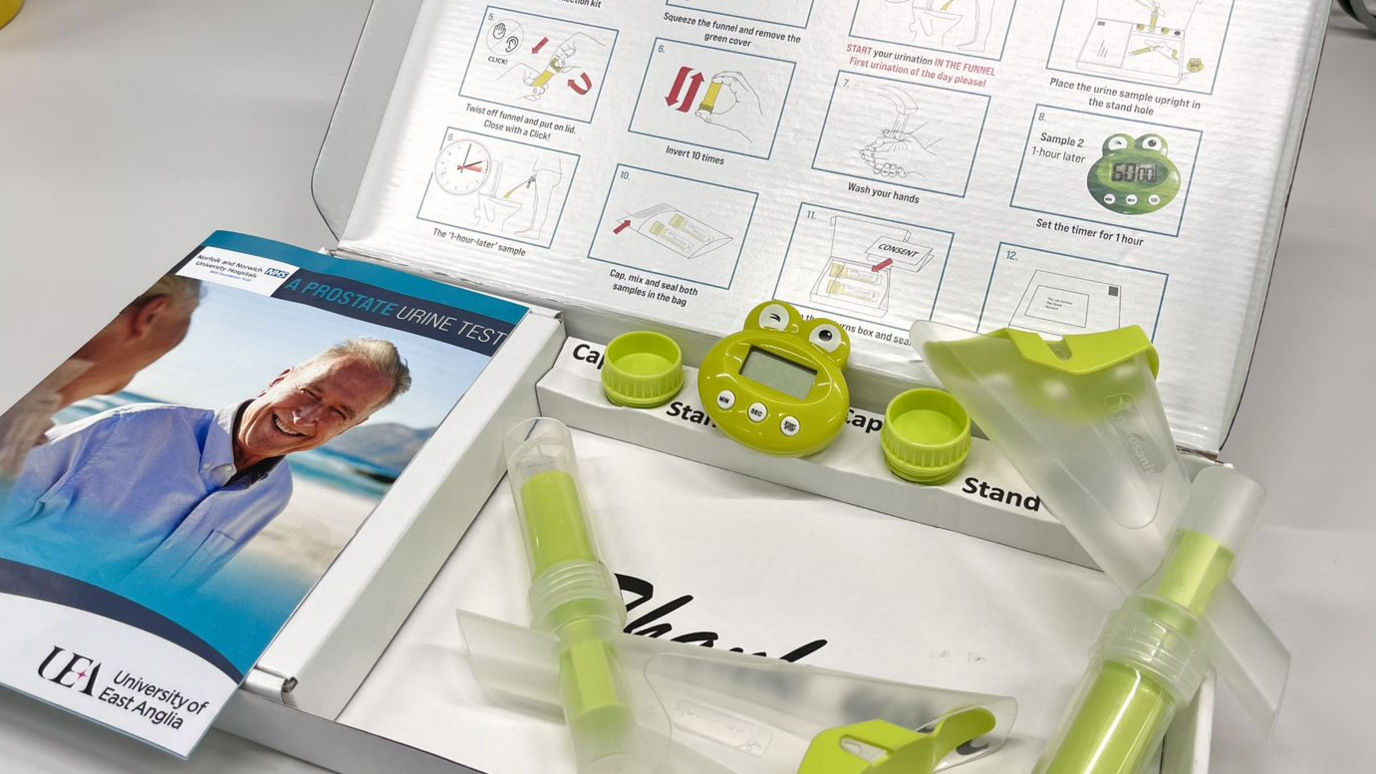University pioneers 'game-changer' prostate tests

The Prostate Urine Risk (PUR) test can be carried out at home
- Published
Two new tests for prostate cancer being pioneered at the University of East Anglia (UEA) are a potential "game-changer" in the fight against the disease.
One in eight men in the UK will develop prostate cancer, with the current PSA blood test able to detect problems with the prostate, but not whether a cancer is benign or aggressive.
The Norwich-based team has developed a home urine-testing kit which can pinpoint a patient's level of risk, and a type of biopsy analysis which can distinguish the most life-threatening forms of the disease.
"It's astonishingly exciting - this is potentially a game-changer both for the initial assessment for prostate cancer, and people who have been diagnosed," lead researcher Prof Colin Cooper said.

Prof Colin Cooper said it was important to avoid invasive treatment for men who did not need it
The vast majority of men diagnosed with prostate cancer can live with a harmless form of the disease, with 10 to 15% developing a type that would require surgery and radiotherapy.
Sir Chris Hoy, 48, who has terminal cancer, has called for PSA testing to be offered to men younger than the target group of over-50s, with Cancer Research UK pointing out that the current testing is unreliable.
The Prostate Urine Risk (PUR) test, developed by Prof Cooper and his team, is a home detection kit which would be posted to the patient, and returned for analysis.
The results can tell them "lots of information" before deciding whether to see a clinician for a PSA test, Prof Cooper explained.
"Whereas the PSA test is completely useless at detecting aggressive disease, the PUR will tell you the risk of having no cancer, of having low-risk cancer, or having intermediate or aggressive cancer," he added.
The new type of biopsy testing - called the 'tiger test' - aims to provide more accuracy than the current analysis, which has "a lot of ambiguity", Prof Cooper added.
A tiny sample of cancer, about the size of a pinhead, is studied for patterns in the genes which can help clinicians determine whether it is an aggressive or "tiger" cancer.
"The critical thing about both tests is they provide extra information to allow the clinician to make a decision on whether you should have radical treatment - a prostatectomy or radiotherapy.
"It's really vital we target our tests and treatment to the men that only need the prostatectomy, which can cause impotence and incontinence.
"We think both tests are an enormous step forward."
It is hoped both tests can be piloted at the Norfolk and Norwich University Hospital next year, with the possibility of expanding UK-wide within two or three years.
David Ellis, director of development and campaigns at the UEA, said the research at the Bob Champion Research Centre was funded by £8m in grants and charitable donations over the past eight years.
It needed a further £2m to help fund the accreditation process, and the clinical and national trials which would hopefully follow.
"The news of Sir Chris Hoy has raised public interest and understanding, and there's an opportunity here at the UEA to take a world-leading role in helping people with a much earlier, better diagnosis," he added.
Get in touch
Do you have a story suggestion for Norfolk?
Follow Norfolk news on BBC Sounds, Facebook, external, Instagram, external and X, external.
Related topics
- Published24 November 2024

- Published14 November 2024
